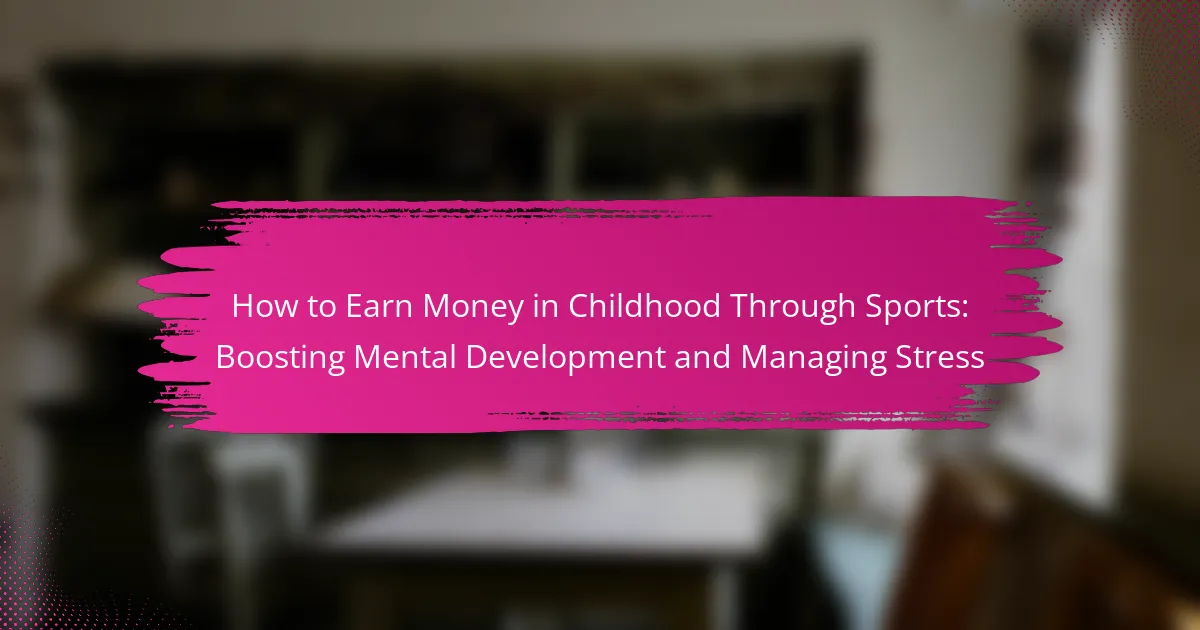Earning money through sports can provide children with financial literacy while enhancing their mental development. Engaging in sports fosters discipline, teamwork, and stress management. Children can benefit from scholarships, sponsorships, and coaching opportunities. Addressing sports-related stressors is crucial for fostering resilience and a healthy relationship with athletics.

How can childhood sports contribute to mental development?
Childhood sports significantly enhance mental development by fostering discipline, teamwork, and stress management. Engaging in sports teaches children how to set goals and work towards achieving them, which builds resilience.
Studies show that physical activity boosts cognitive function, improving concentration and memory. For instance, children involved in sports report lower levels of anxiety and depression, showcasing the unique attribute of sports as a stress-relief mechanism.
Participating in team sports cultivates social skills, enhancing communication and cooperation. This interaction contributes to emotional intelligence, a rare attribute crucial for personal and professional success.
In summary, childhood sports serve as a powerful tool for mental growth, equipping children with essential life skills while promoting overall well-being.
What are the cognitive benefits of participating in sports?
Participating in sports enhances cognitive benefits by improving focus, discipline, and stress management. Engaging in physical activity boosts brain function, leading to better academic performance and mental resilience. Studies show that children involved in sports exhibit higher levels of concentration and improved problem-solving skills. Additionally, sports provide a structured environment that fosters teamwork and social skills, crucial for mental development.
How do sports foster emotional resilience in children?
Sports significantly enhance emotional resilience in children by providing structured environments for teamwork, coping with challenges, and developing discipline. Participation in sports teaches children how to handle both victory and defeat, fostering a growth mindset. For instance, children learn to manage stress through competition, which helps them build coping strategies applicable in various life situations. Additionally, engaging in sports promotes social connections, offering support systems that further bolster emotional well-being. As a result, children involved in sports often exhibit improved self-esteem and better emotional regulation, essential traits for resilience.
What role does teamwork play in mental growth?
Teamwork significantly enhances mental growth by fostering collaboration and communication skills. Engaging in sports as a child promotes social interaction, which builds confidence and resilience. Team activities encourage problem-solving and critical thinking, vital for cognitive development. Additionally, shared goals in sports teach children the importance of cooperation and empathy, key attributes for mental well-being.
How can cooperative games enhance social skills?
Cooperative games significantly enhance social skills by fostering teamwork, communication, and conflict resolution. These games require players to collaborate towards a common goal, which strengthens interpersonal relationships and promotes empathy. As a result, children learn to share, negotiate, and appreciate diverse perspectives. Studies indicate that engaging in cooperative play can lead to improved social interactions and increased self-esteem among participants.
What are the impacts of competition on self-esteem?
Competition can significantly impact self-esteem, often leading to both positive and negative effects. Engaging in sports during childhood fosters resilience and self-confidence through skill development and teamwork. Success in sports can enhance self-worth, while failure may challenge a child’s self-image. Additionally, healthy competition teaches valuable lessons in perseverance and emotional regulation, contributing to long-term mental development. Managing stress through sports can further bolster self-esteem, as children learn to cope with pressure and develop a growth mindset.

What unique opportunities do sports provide for earning money?
Sports provide unique opportunities for earning money through scholarships, sponsorships, and coaching. Participating in sports can lead to scholarships that cover educational expenses, allowing young athletes to focus on their development. Sponsorships from brands can also provide financial support in exchange for promoting products, creating a revenue stream. Additionally, older athletes can earn money by coaching younger players, sharing their skills and knowledge while generating income. These avenues not only enhance financial literacy but also contribute to mental resilience and stress management.
How can children monetize their sports skills?
Children can monetize their sports skills through various avenues like coaching, participating in competitions, and creating content. Engaging in sports enhances mental development and helps manage stress, making it a valuable pursuit.
1. Coaching: Older children can offer coaching sessions to younger peers, earning money while reinforcing their own skills.
2. Competitions: Participating in local or national sports competitions can provide cash prizes and sponsorship opportunities.
3. Content Creation: Sharing training tips, tutorials, or sports-related content on platforms like YouTube or social media can attract followers and generate income through ads and sponsorships.
These activities not only provide financial benefits but also promote discipline and resilience in children.
What are some common avenues for young athletes to earn income?
Young athletes can earn income through various avenues such as sponsorships, coaching, and sports-related jobs. These opportunities not only provide financial benefits but also enhance mental development and stress management.
Sponsorships offer young athletes the chance to partner with brands, receiving financial support in exchange for promoting products. Coaching roles allow them to share their skills with peers, fostering leadership and responsibility. Additionally, working in sports retail or as referees provides practical experience and income.
Participating in competitions with cash prizes can also be a lucrative avenue. Engaging in these activities helps young athletes cultivate discipline and resilience while managing stress effectively.
How do sponsorships work for young athletes?
Sponsorships for young athletes provide financial support in exchange for brand promotion. Brands often seek to associate with talented athletes to enhance their visibility. Young athletes can benefit from sponsorships by receiving funds for training, equipment, and competition costs. Additionally, sponsorships can boost an athlete’s confidence, providing motivation and reducing stress. Establishing a strong personal brand through social media can attract potential sponsors, allowing young athletes to showcase their skills and values.
What role do social media platforms play in promoting young athletes?
Social media platforms significantly enhance the visibility and opportunities for young athletes. They allow athletes to showcase their skills, engage with fans, and attract sponsorships. Platforms like Instagram and TikTok facilitate the sharing of training routines and achievements, fostering a community around sports. This exposure can lead to unique opportunities, such as endorsements and scholarships, which are critical for mental development and stress management in youth sports.

What are the rare challenges children face in sports regarding stress?
Children face rare challenges in sports-related stress, including performance anxiety, social pressure, and fear of failure. These stressors can hinder mental development and emotional well-being. Performance anxiety often manifests when children feel they must meet high expectations, leading to a decrease in enjoyment and increased stress. Social pressure from peers and parents can create an overwhelming environment, causing children to prioritize winning over personal growth. Fear of failure may prevent them from taking risks, stunting their development in both sports and life skills. Addressing these challenges is crucial for fostering resilience and a healthy relationship with sports.
How can parental pressure impact a child’s experience in sports?
Parental pressure can negatively impact a child’s sports experience by increasing stress and diminishing enjoyment. Children under high parental expectations may focus more on performance than personal growth. This pressure can lead to anxiety, burnout, and a decreased likelihood of long-term participation in sports. Studies show that children who feel supported rather than pressured perform better and develop a healthier relationship with physical activity.
What are the signs of burnout in young athletes?
Signs of burnout in young athletes include chronic fatigue, decreased performance, loss of interest, irritability, and physical symptoms like headaches. These indicators can hinder their mental development and stress management. Addressing these signs promptly is crucial for maintaining their overall well-being and enjoyment in sports.

How can stress management techniques improve performance in sports?
Stress management techniques significantly enhance sports performance by improving focus, resilience, and overall mental health. Techniques like mindfulness and visualization help athletes maintain composure under pressure. Research indicates that athletes who practice stress management show improved decision-making skills and reaction times. As a result, effective stress management directly correlates with better performance outcomes in competitive sports.
What are effective strategies for managing stress in young athletes?
Young athletes can manage stress effectively through techniques like mindfulness, time management, and physical activity. Mindfulness practices, such as meditation, enhance focus and reduce anxiety. Time management helps balance sports with academics, alleviating pressure. Regular physical activity releases endorphins, improving mood and resilience. Encouraging open communication with coaches and parents fosters a supportive environment, allowing athletes to express their feelings and seek guidance.
How can mindfulness practices be integrated into sports training?
Integrating mindfulness practices into sports training enhances focus, reduces stress, and boosts mental resilience. Techniques such as breathing exercises, visualization, and meditation can be seamlessly incorporated into warm-ups or cool-downs. For instance, athletes can practice deep breathing to calm nerves before competitions, fostering a unique attribute of mental clarity. Additionally, regular mindfulness sessions can improve overall performance by promoting a root attribute of enhanced concentration. As a result, athletes not only improve their skills but also cultivate emotional well-being.
What role does physical conditioning play in reducing stress?
Physical conditioning significantly reduces stress by enhancing physical health and mental resilience. Regular exercise releases endorphins, which improve mood and decrease anxiety. Engaging in sports fosters social connections, providing emotional support and a sense of belonging. Furthermore, structured physical activity teaches discipline, helping children manage stress effectively. This multifaceted approach not only boosts mental development but also equips young athletes with essential coping strategies for life.

What best practices can parents adopt to support their children in sports?
To support children in sports, parents should encourage participation, emphasize enjoyment, and foster a positive environment. Focus on skill development and teamwork while managing stress through balanced schedules.
Promote open communication to address concerns and celebrate achievements, enhancing mental resilience. Establish routines to help children balance sports and academics, ensuring overall well-being.
How can parents encourage a healthy balance between sports and academics?
Parents can encourage a healthy balance between sports and academics by setting clear priorities and fostering an environment that values both. Establishing a structured schedule helps children allocate time effectively for studies and practice. Encouragement should focus on the benefits of sports, such as improved mental health and stress management, which can enhance academic performance. Additionally, parents can model a balanced lifestyle, demonstrating the importance of both physical activity and education. Open communication about goals and challenges allows children to express their needs and interests, promoting a supportive atmosphere.
What are common mistakes parents make in supporting young athletes?
Parents often overlook the importance of balancing support with independence for young athletes. Common mistakes include overemphasizing competition, neglecting mental health, and failing to foster a love for the sport. Overemphasis on winning can lead to stress and burnout, detracting from mental development. Additionally, parents may not recognize signs of anxiety or pressure, which can hinder performance and enjoyment. Encouraging autonomy and celebrating effort rather than just results can enhance young athletes’ overall experience and growth.
How can communication enhance the sports experience for children?
Effective communication significantly enhances the sports experience for children by fostering teamwork and building confidence. It encourages collaboration among peers, which is essential for developing social skills. Open dialogue allows children to express their thoughts and feelings, reducing anxiety and stress during competitions. As a result, children experience improved mental development and greater enjoyment in sports activities. Engaging in sports with clear communication also teaches children valuable life skills, such as problem-solving and conflict resolution. These skills contribute to their overall personal growth and well-being.
What expert insights can guide parents in fostering a positive sports environment?
To foster a positive sports environment, parents should prioritize encouragement, communication, and balance. Encourage effort and improvement rather than solely focusing on winning. Open lines of communication with children about their feelings and experiences in sports enhance their mental development. Balance sports with other activities to manage stress and avoid burnout, ensuring a well-rounded childhood experience.


